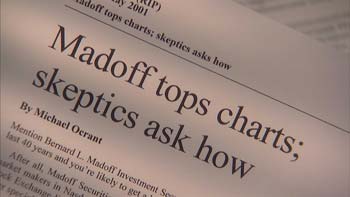
On Dec. 11, 2008, Bernard L. Madoff confessed that his vaunted investment business was all "one big lie," a Ponzi scheme colossal in volume and scope that cost investors $65 billion. Overnight, Madoff became the new poster child for Wall Street gall, greed and corruption.
Through exclusive television interviews with those closest to Madoff's operation, veteran FRONTLINE correspondent Martin Smith unearths the details of the world's first global Ponzi scheme -- a deception that lasted longer, reached wider and cut deeper than any other business scandal in history -- in The Madoff Affair.
[Editors' Note: Here’s a MainStreet.com interview with Smith about his experience making this film.]
"The first flush of reports came out at a time when many people were still reluctant to talk," says Smith. "FRONTLINE gave us the time to burrow deeper, gaining access to some of the key players who gave us an understanding of how Madoff pulled it off."
In a search for clues on how the fraud began, FRONTLINE traces Madoff's story back to the early 1960s, when he first opened a small investment advisory business and hired two accountants, Frank Avellino and Michael Bienes, to help him recruit clients. In an exclusive television interview, Bienes describes those fruitful early years. It was "easy, easy-peasy, like a money machine," Bienes tells FRONTLINE. When asked if he had ever questioned Madoff about his approach, Bienes says: "Never. Why would I ask him? I wouldn't understand it if he explained it."
By the early '90s, Avellino & Bienes had amassed more than 3,000 clients. But the accountants were violating the law, selling unregistered securities. Acting on a tip, the SEC closed down Avellino & Bienes. Madoff was forced to return more than $400 million to investors. It was Madoff's first brush with the SEC, and as would happen again and again during the course of 30 years, Madoff would remain untouched by regulators.
After the 1992 SEC investigation, Madoff insulated himself from his client base by finding several financiers eager to do business with him and willing to accommodate his unusual demands for secrecy. In an exclusive TV interview, Sandra Manzke, the founder of the hedge fund giant Tremont, admits she agreed not to use Madoff's name in her fund's prospectus, and she accepted that Madoff would only use a small, off-the-radar accounting firm to audit his work. "Of course it bothered you," she tells Smith. "But that was one of the conditions of doing business, that you accepted that. That was his proprietary trading model, the black box that he used, and he wasn't going to disclose what was in it" -- not even to Manzke, who for more than 25 years placed upward of $3 billion of investors' money with Madoff.
The incentive for fund managers like Manzke to ignore their reservations was enormous. Running a feeder for Madoff was a very lucrative business, and nobody got richer than Walter Noel and his partners at Fairfield Greenwich Group. "It's fair to say that Fairfield, more than anyone else, took Madoff global," says attorney Stuart Singer of Boies, Schiller & Flexner, who is now representing former Fairfield Greenwich investors in a class-action suit.
Through interviews with former employees of Madoff Securities and footage FRONTLINE unearthed of Madoff's operation, the film ultimately takes viewers inside the heart of the fraud. Rich Caputo, who maintained the computers and printers at Madoff Securities, saw the volume of paperwork that went into sustaining the fiction. "We were spitting out statements constantly," Caputo tells FRONTLINE. "The fact that all of these statements were just sort of made out of thin air is pretty shocking."
Madoff was repeatedly investigated by the SEC, but it found nothing amiss. Madoff remained a pillar of the financial world until the markets came crashing down in late 2008. "The fact is, he easily could have gone through his life without this being found out," says Madoff investor Burt Ross. "The only reason that this ended was because, at one given point in time, the economy did so badly that people wanted -- needed -- to get money out of Madoff's investments."
